Dissecting million install meetup – How a tech startup managed to pull over 100 growth hackers
Meetups can open a pandora’s box of opportunities for a tech startup. At least, that’s what we have realised after hosting our first ‘Million Install Meetup’.
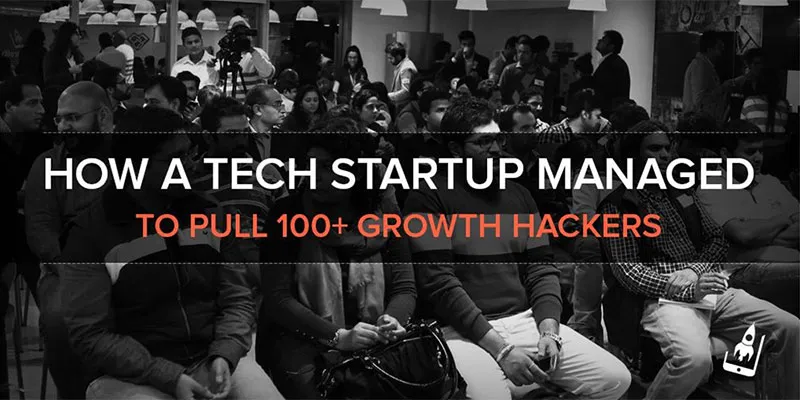
Apart from amazing ways of connecting with an audience through online channels, everyday emails, and phone chats, most tech startup often miss a personal face-to-face interaction with their immediate community. Meetups tend to bridge this shortfall, boost growth, create word-of-mouth, and strengthen the ties between the community and the brand.
That’s a long list of positives. However, a lot of it will depend on the end goal that a startup wants to achieve through such an initiative. We’ve discussed it later in the article.
Planning a meetup requires a lot of grey cells and can get overwhelming at certain levels. Therefore, we have divided this section into three categories, namely:
- Pre-meetup arrangements.
- Event day.
- Post-meetup arrangements.
If you are a tech startup interested in doing the same, this article will not only provide you with a blueprint to get started, it will also help you take the right steps associated with organising one.
But before you begin, here’s a crucial bit.
Big or small meetups? Why does it matter?
Let us tell you that meetups are not conferences! They are an informal way to connect with your most loyal users, and therefore, it should be kept that way, which is a small gathering of users and industry partners.
It will not only give your team an opportunity to interact with each attendee but will also give you a breathing space (who said events are easy to host!).
Pre-meetup arrangement
Meetup planning isn’t for faint-hearted. However, it isn’t as difficult as it is believed to be. A pre-meetup arrangement ensures that the plan is workable.
1) Structuring the idea
Giving shape to the initial idea of the meetup is the most crucial bit. One needs to define the purpose, and therefore, it is essential to list down the positives of hosting one for your startup.
For us it served three purposes:
- Firstly, it was an ingenious way of understanding our community.
- Secondly, it would give us an opportunity to address questions about mobile growth that do not come up in a normal course of interaction.
- Lastly, it would provide us a platform to interact with members who were genuinely interested in the dynamics of mobile growth hacking.
Thankfully, we were able to achieve all our goals. We named the meetup as ‘Million Install Meetup’ since it resonated with our value proposition and what we wish to achieve for our users.
2) Team selection
Given the compressed team sizes in a startup, it is essential to list down the members who would take the onus of streamlining the entire event.
In our case, we were experimenting in a newer territory and therefore did not want to disrupt the core functioning of the team. Hence, we zeroed on a four-member team that included our Sales and Marketing Mavericks along with our co-founder.
The reasoning for this was very simple. We knew that a lot of our user base was present in Gurgaon (our first city meetup) and, therefore, it will invite a lot of product-specific questions. It gave our sales team an opportunity to resolve queries and also initiate new dialogues with probable customers. A large part of which was done involving our co-founder.

The marketing team was required to take care of branding, PR, and other aspects associated with the event and hence the inclusion.
3) Delegation of tasks
Soon after picking up the tasks, we created a Trello board so that we could track our progress on each delegated duty. We had numerous Skype chats to ensure that we were on the right track.

Planning an event cannot be a one day or a one week process. The team should spend at least a fortnight or a month as it includes a lot of micro-elements such as travel, in-city logistics, permissions, catering, and other finer aspects.
With our experience, we can say that these things tend to linger till the last minute and, therefore, a clear cut strategy will help you to be better prepared for it.
4) Budgeting
Although this list is no particular order, one should not overlook this aspect. In fact, there will be a lot of budget alterations and last-minute additional expenses. However, to avoid unnecessary fall outs, it is prudent to work with a round figure in mind. Here’s a snapshot of what our budget sheet looks like.
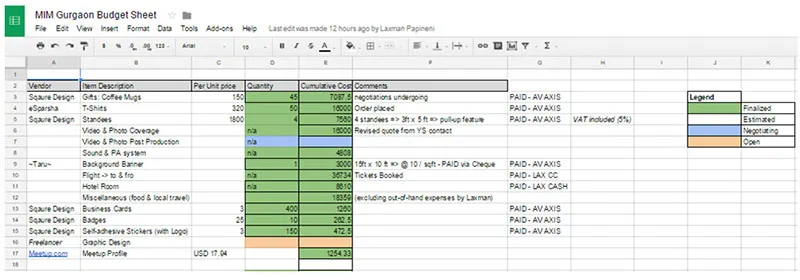
5) Follow-up
If you are planning a meetup, you would realise that it entails services of multiple vendors, especially if you are hosting it outside the city. We needed assistance with banner printing, sound system, and photography and were lucky to get the best quotes from our partners, friends, and family based out of Gurgaon.
However, this may not be the case always. Therefore, it is advisable to shortlist a few vendors, verify their credentials, check sample of their work, and hire them accordingly. A follow-up in such cases can help one with any last minute nuisance.
6) Panel selection
Panel selection is the key to the success of a meetup. People want to listen and discuss issues with individuals who are not only experts but also have knee-deep experience handling similar issues.
Our approach towards short listing the panel was pretty methodical. Thus, after much research and brainstorming we zeroed on this awesome panel!
(Image panel)
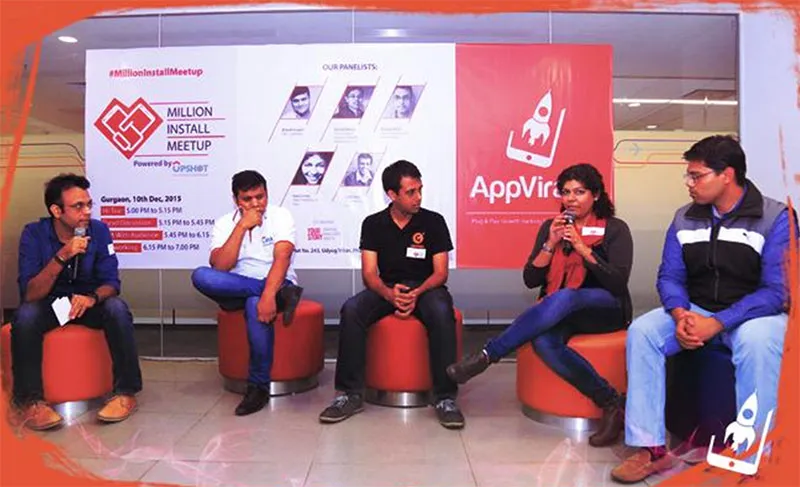
Panelists for the Gurgaon chapter included Bharath Lingam – CEO at Upshot.ai, Deepak Abbot – Head Mobile Growth at Times Internet, Anirudh Maitra – Senior Product Manager (Mobile) at MakeMyTrip.com, Gauri Juneja – Head Marketing at WOO, and Kshitij Torka – VP Marketing at Grofers.
Here’s a quick tip for first-timers. Panel selection should always supersede venue selection since it entails checking on schedules of various people, for a particular day. We also encountered last minute dropouts, and the same can happen to anyone!
Once you have shortlisted the panel, ensure that you reach out to them via email or social media and share your agenda. Once they agree to be a part of it, keep them in the loop so that they get comfortable with the idea and have sufficient time to prepare notes, etc.
A good idea is to introduce them with each other by sharing a fair bit about themselves. The panelists should have a clear picture of each other's strengths, and it will display positively during normal course of discussions and Q&A rounds.
7) Venue selection
Given that meetups are informal gatherings, one need not worry about the venue as such. It can be a neighbourhood cafe, a popular eatery, a co-working space, or just any place that compliments and allows your meetup theme.
We were lucky to be hosted by our partners and got an awesome space at the MakeMyTrip HQ. The entire administrative team at MakeMyTrip helped us in every possible way to make this meetup a success.
8) Sponsor selection
Ask any event manager and they will tell you that sponsor selection is a crazy bit. That’s because it is a two-way street – no sponsor will want to associate them with a bland brand/startup and likewise.
The best way to find a sponsor is to explore within your network, and you will be surprised by the number of people who would be ready to support your initiative! For us, YourStory and Upshot.ai became that platform. Being our clients, FAASOS and MakeMyTrip became our gracious high tea and venue partners, respectively.
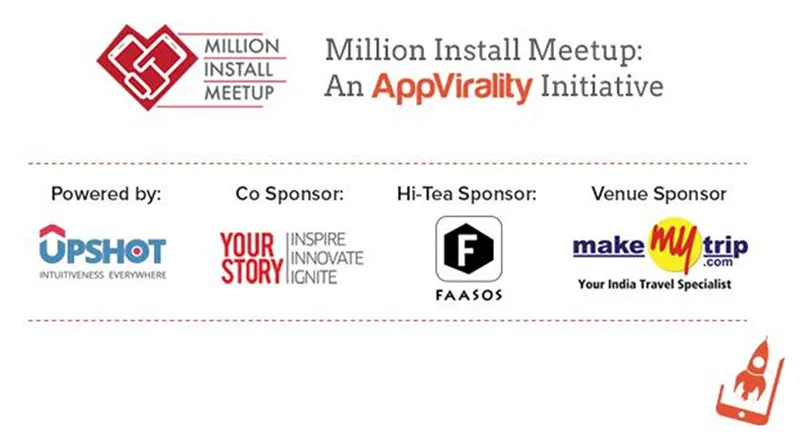
A word of advice here is to list down the possible deliverable associated with sponsors in a pre- and post-event format. This would ensure that everyone is on the same page.
- Pre-marketing strategy
Hosting a meetup is a way of extending the brand name and, therefore, it requires proper presentation. This involves streamlining a logo, strategising email and social media campaign.
Our marketing strategy would have been high and dry without the help of our freelance and in-house design team. They worked round the clock to design email templates, social media banners, standee and startup swag! A large part of it was executed a week in advance to avoid last minute delays.
- Pre-promotion strategy
Making the world talk about your event isn’t an easy feat. That’s why pre-promotion strategy matters, the extent of which will vary from one startup to another.
Our idea was to create limited buzz and not go overboard with it, considering that this was our first event and testing ground. The story of the event was shared on YourStory platform, which was also the point for registrations, which triggered promotions to a large degree.
In a quest to reach significant community members, we intimated our existent users who helped us in spreading the word around, via email newsletter, personalised emails, and social media. We also ran a drip campaign to ensure a decent footfall on the day of the event. It is advisable that promotions and marketing of the meetup continues till the day of the event!
Another great takeaway is to announce the meetup schedule/s well in advance. This gives people a lot of time to prioritise their attendance. Here’s a great example of how Airbnb does it:
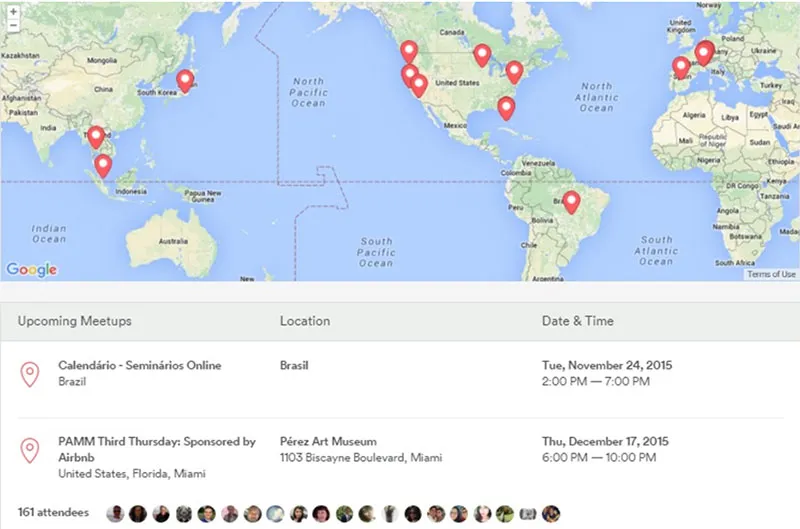
Once you have covered the points mentioned above, it would be much easier for your team to handle situation on the day of the meetup. Remember, that meetups can get chaotic; however, with proper planning one can bounce back pretty quickly.
Event day planning
Here are a few crucial points to remember on the day of the event.
- Reach the venue way ahead of time for timely setup.
- Make a conscious effort to follow-up with vendors and ensure that all of them reach the venue before time. You wouldn’t want to be setting up the place when your guests start to arrive.
- Ensure that all permissions are in place, especially the ones that concern the entry of the visitors.
- It is always a good idea to break the ice with your guests and panelists. I guess our team handled this bit pretty brilliantly. We let the panelists interact with each other, which helped them get the right grip around the topic. We also ensured that we interacted with our guests and no one was left feeling out of place.
- Introduce the panelists to the guests so that they can direct their questions accordingly.
- Encourage your attendees to spread a word around the event hashtag.
- Let your team cover the event via live tweets. Thankfully, we all are connected via Slack, so it was an easy task.
- Build a buzz around your swag! We shared some awesome coffee mugs with the participants. Not only is a great way to build connect, but it also ensures that your brand remains on top of their minds!
- Own the event and be genuine in taking feedback!
- Most importantly, DO NOT make the event about your brand, MAKE IT about your community.
What we could have done better:
- After analysing our post-event data, we realised that that the Q&A session can be improved drastically. Given the popularity of the topic, there were way too many questions and due to time constraints, we couldn’t take them all. Collating questions well in advance could have made a lot of sense!
- We can also improve our social media strategy in the next meetup to increases engagement during the event.
- The process of registrations can be simplified, as well. It is always a good idea to handle registration on your website as opposed on a third-party website. This ensures better and timely action on the data.
Post-event planning
Post-event planning has its own significance, and it could shape the overall way your brand is perceived. Your meetup should not look like a one-time data collection programme. Believe us, that’s a major turn-off.
Here’s what you need to do:
- Make an attempt to send a thank you email to all those involved. If you have sufficient budget, a token of thanks does not hurt either!
- Take time out and collate the data from all the sources and reach out to as many people as possible. The sooner, the better.
- Settle invoices in time. There is nothing as bad as delayed payments.
- Seek feedback from attendees! They are the best judge of the event after all!
- Write an awesome post about your experience.
The final thoughts
There’s no right or wrong way of hosting an event. In fact, a lot of it will depend on prior experience and your community size. However, there isn’t a better joy than interacting with your everyday users and well-wishers, and in that aspect, meetups rank pretty high.
Did you attend the Million Install Meetup? Do let us know your feedback here.
Want to win an awesome coffee mug? Refer a team mate to us and we shall ship the same to you! (Limited to first five users). Click here for current openings. Intimate us via email on growth [at] gmail.com
Do share your experiences of hosting a meetup for your tech community. Do check out our next article that talks about end-to-end budget and analytics of the event!







